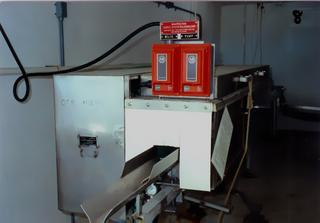Salmon medley sells in India

This article from an Indian publication caught my eye the other day, so I didn't delete it, but didn't know what to do with it either. Today is a different day. I think it bears some looking at. Only goes to show how our perceptions can change when our priorities change. I feel a little stronger about value adding by fishermen's groups today for some reason.
This salmon gutting machine is not nearly the brute the old iron chinks are.
This is the part that got my attention: "The range, launched by Sea Food Club includes Alaskan smoked pink salmon fillet, canned salmon in brine, salmon pickle and salmon sausage. "Sea Food Club has a veritable salmon feast and I am actually taking some back home to Perth," Lillee said."
These are about my all-time favorite salmon products. Seems like Sea Food Club thinks so too. It begs the question, what salmon product forms does the rest of the world want? And how is Alaska going to give it to them, and who is going to give it to them, and who should benefit from this trade?
I think it's pretty clear that the answer to the last question is, the coastal communities. Then you can back up to answer the other questions. So, in this vein, how many of the coastal communities should benefit? Would it be OK if just a couple of them did all the processing as the current consolidation in processing is effecting? I don't think that the communities that get left out in the cold are too happy about this state of affairs.
These communities are going to have to join the discussion, get up to speed on a lot of things seafood and fight for their lives, using their local fishermen, if there are any left, to lead the charge. Doesn't that sound reasonable? I've talked to many community leaders and they don't have backgrounds in the seafood industry. City managers are professional city managers, period. While they figure these industries will take care of themselves, they are falling down on the job, and their towns suffer for it..
Two communities in Southeast Alaska with very long histories of involvement in the seafood industry are in the throes of dropping out of the business, Kake and Pelican. There are quite a few others around the state too.
Making the products that markets, like the above one require, can be made in all the former seafood processing communities that are going under. City managers should be bending over backward to help fishermen gain control of their, and hence their communitys' destinies. And the Regional Seafood Development Associations are designed to do this.


0 Comments:
Post a Comment
<< Home